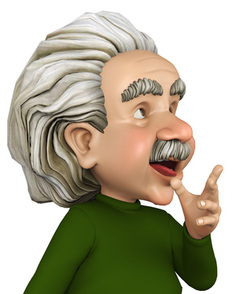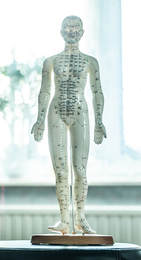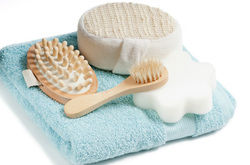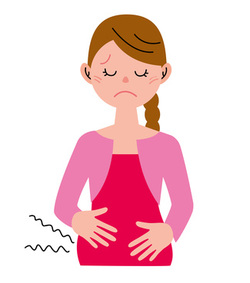 We cannot solve our problems with the same thinking we used when we created them. - Albert Einstein Do you have problems that you just can't seem to solve? Are there issues in your life that seem constant, regardless of how hard you try to overcome them? Do you feel you stuck in a rut, getting nowhere fast? The definition of insanity is doing the same thing over and over again, but expecting a different outcome. I mean really, wouldn’t you need to be mad to think that somehow, magically, one time, if you keep doing the same thing, you’re going to get a different outcome? So if you want to get a different outcome, you need to do something different. If you want to feel differently you need to think or act differently. But what do you need to do? Well perhaps you already know... have you've been saying to yourself – “If I just did A, B or C it would help me to X, Y or Z”, so for example –
But how to you stop getting anxious, look after yourself better and do something new? It’s not always easy. I'm a great believer in the path of least resistance. Why put huge amounts of effort into overcoming resistance when you can just go round it with no effort at all. It's not about being lazy (well not much!), it's about being sensible and efficient - why make things hard for yourself if you don't need to. And that's one of the reasons I love Reflexology! Reflexology is a physical approach that can impact on mental and emotional states. Our mind, body and emotions are not separate entities, they're all part of us and if one part is out of balance, all of us is out of balance. So, Reflexology is not just for those wishing physical benefits (although it's great at providing that), it's for anyone who feels an imbalance in mind, body or emotion. For example, if you are going through a challenging time emotionally, and all the talking about it has taken you nowhere, perhaps a relaxing Reflexology treatment will allow you to feel more in tune with yourself and less anxious, angry, fearful, or whatever other emotions are implicit in your situation. And if you feel less anxious, angry, fearful, etc you will respond in a different way and your problem will appear in a different light to you. So, if thinking about something causes you to feel a certain way, then changing the way you feel can cause you to change the way you think. No effort, no resistance, no problem (or at least less of a problem). And with Reflexology, you just sit back and let someone else take the strain. So, if you're making things hard for yourself, give yourself a break and if you haven't tried it before, give Reflexology a chance. To book an appointment, contact me (Doris) on 07724 197627.
0 Comments
 I’ve been reading a couple of things recently which have deepened my understanding about Reflexology and complementary therapies and I've come up with my own view about the real reason why Reflexology works. One of the problems for many people about Reflexology is the lack of visible link between the feet and the rest of the body. How can Reflexology work when there is no visible or defined pathway between the feet and the various parts of the body? There are many theories about how Reflexology works but no definitive answer and acupuncture meridian pathways are often used as a solution – working on the feet access energy pathways throughout the body and that balances the body. I’m quite happy to accept that explanation, but I’ve also got a theory of my own. My theory is based on a few suppositions:
Are you beginning to see a theme develop here? Making a decision has a powerful effect on outcomes. From my personal experience and also from my NLP (Neuro-Linguistic Programming) training, the very act of deciding that something will be so (rather than wishing it will be so) gives it an energy and direction that makes it more likely to be created. Ever had a sore tooth and once you’ve made your appointment with the Dentist the pain disappears? That’s the effect of decisions! Of course it doesn’t mean you don’t go to the Dentist - because the tooth still needs work - but the power of that decision gave (maybe temporary) relief from the pain of toothache. So, imagine you’ve got a health condition (which may well be stress related), or that you decide you’d like to be as healthy as possible. You then want to take action to support that decision. You think that Reflexology might be nice and you book an appointment. What’s just happened - you’ve already made a decision to improve your condition AND you’ve taken action to make that decision become a reality, so before you even turn up for your appointment, you’ve indicated to your unconscious mind (which runs your body) that you want to be better. Then, you turn up for your appointment and find yourself experiencing a relaxing and balancing treatment. Most people find Reflexology relaxing (and remember, you can’t be stressed and relaxed at the same time): and that relaxed state moves your body towards a state of homeostatis (the maintenance of a constant internal environment) where the body can function more effectively. And you enjoy the treatment because, what’s not to like about lying back and being pampered? I think the power of “relaxing” and “balancing” is often underestimated: they sound such soft, nebulous, ineffective words. Relaxing and balancing doesn’t really seem to DO anything powerful or dynamic: they seem passive and inactive things to aim for. But the power of doing nothing can be profound:
So the next time you see Reflexology (or any other therapy) described and relaxing and balancing, or you wonder if your reflexology treatments are really doing any good, consider that sometimes, not doing (ie BEING) can be just as powerful and doing. And if you have spent too much time recently doing rather than being, you can book a Reflexology or Indian Head Massage treatment by contacting: Doris Wylie 07724197627  You shower or bathe every morning, right? So why not incorporate a dry body brushing routine before you step into the shower or bath – I guarantee, it will set you up for the rest of the day. Body brushing uses a loofah or natural bristle brush with a long handle (or you can use synthetic gloves, but it doesn’t feel as nice). To get the desired effect, the brush should always be kept dry. Not only will body brushing leave you feel refreshed and energised after your shower or bath, but it will help your body detoxify, exfoliate dead skin cells, improve circulation and lymphatic drainage and reduce the appearance of cellulite. The skin is the largest organ in the body and plays an important role in the elimination of toxins. and of course, smooth skin is particularly nice to have at this time of year when (hopefully) summer is just around the corner. So, how does one body brush? Well it's important to work on dry skin to get the desired effect and it's essential to work towards the heart because that stimulates the flow of lymphatic fluid. It also helps if you can remember to keep your touch light and your strokes sweeping. By the end of your body brushing routine, your skin should feel tingly, rather than sore or scratched. Begin with the feet and ankles and then move to lower legs, thighs, stomach, back and arms. Your back is the exception to the brushing upwards rule - for your back you are best to brush from the neck down. And remember it's called body brushing - so stay away from the delicate skin of the face. Once you're feeling full of zing from your brushing, you can jump into your shower or bath and wash away the dead skin cells. And afterwards, if you've got time, moisturise for that nourished, smooth, supple skin feeling. A couple of notes of caution: be careful of delicate skin areas and don't dry body brush over inflamed, cut or broken skin, or over varicose veins. Also, have your own personal body brush and wash it regularly. Give body brushing a try daily for 30 days and see the health and beauty benefits - better circulation and smoother skin. Of course, if you run out of stamina, jump into the shower before you remember to do your body brushing, or just want someone else to take the strain, a reflexology treatment could be a good substitute. It's relaxing, reviving and helps re-balance the body. And there's 20% off your first treatment in May and June 2014.  I've been doing a clear out recently, a big clear out. I've been going through my Reflexology paperwork and one of the documents I came across was an article written by Tracey Smith FMAR, from the Association of Reflexologists. It was an article from March 2012 - which I read at the time, but was so interesting that I kept it. In fact it was so interesting that I'd like to share it now. Tracy quotes research by Michael Gershon of Columbia University and suggests that it has begun a deeper understanding of the role of the 100 million neurones in the wall of the bowel. There are so many neurons in the gut - roughly the same size as a cat brain when put together - that it has become known as the 'second brain'. We've probably all experienced that "butterflies in the stomach" feeling: the uncomfortable, twitchy, nervous feeling we get when we're excited or scared. Well, that feeling is produced by those 100 million neurons in the gut, the second brain, sending out a surge of stress hormones that affect not only the stomach, but other organs of the body too. The 'gut brain' communicates with the brain in a two-way process - receiving information from the brain and sending information to the brain. Tracy says "The brain's job description is that it controls behaviour, takes input and generates responses. The enteric [gut] brain primarily deals with digestion so that it is 'on site' rather than having to pass through the central nervous system to the main brain. However, it has other actions too, as 90% of the vagal nerve fibres pass information from the gut to the brain rather than the other way around. Electrical stimulation of this nerve has been used as a treatment for depression, so our guts really do inform the brain in relation to our emotions. It has been found that approximately 95% of the body's total concentration of serotonin is found in the gut - serotonin is the feel good hormone ..." If you or anyone you know has ever suffered from Irritable Bowel Syndrome (IBS) and tests have come up normal it's tempting for the medical profession to assume that the root cause must be psychosomatic. However, Tracy suggests that research indicates that lack of the transporter molecule for serotonin means that serotonin remains present to continue producing the muscular reflexes. So IBS may be a 'gut brain' issue rather than a 'brain brain' issue. But what does that have to do with Reflexology, Indian Head Massage, or any other complementary therapy? Well, one thing I know for sure is that Reflexology and Indian Head Massage are relaxing - for almost everyone - and that there are something like 7,000 nerve endings on each foot sending sensory input to the brain(s). And if that sensory input is relaxing then the 'gut brain' will get the message just as quickly as the 'brain brain' - so mind and body can come into balance. And that can't be a bad thing, can it?  It can sometimes feel that staying healthy and ageing well can be an uphill struggle. There seem to be so many conflicting ideas about what we should and shouldn't eat, which is the best diet to follow, how much or little exercise we should get and what type of exercise is best. There's plenty of advice on what supplements and special healthy products we should be including in our diet and which health and fitness guru to follow - because different ones seem to pop up all the time, with new ideas and products. Of course, much of this is designed to relieve us of our hard earned cash, so what is the best way to stay healthy or even improve your health? I've developed a list of easy actions to take which cumulatively with benefit your health and well-being. Most cost nothing and there's a fairly heavy emphasis on reducing stress ... Belly breathing - Take a long slow breath in through your nose. Push the air down into your tummy, almost down to your waist. Let it out again slowly. This deep breathing oxygenates your blood, feeding the body cells; it reduces muscle tension and blood pressure; it clears out stale air from the lungs and opens the airways. If you are under severe pressure, you can't do anything more effective to calm yourself down than taking a series of long slow breaths. Exercise - Stress produces chemicals which, if they are not naturally neutralized are stored in the body to create a toxic effect. Exercise is a great way to release these chemicals. The key thing is not to overdo it. Work at 70% of your capacity in order that you don't tire yourself out. Give yourself a day off to rest your body. Do something you enjoy, it doesn't have to be difficult: a brisk walk in the country surrounded by the sights and sounds of nature will both tone the body and calm the mind. Take more water - Often our fluid intake can affect our energy levels. Water helps rehydrate the body and it feeds the brain (water helps to conduct all those electrical connections). If you are dehydrated your system functions less efficiently. Water helps the kidneys to function more efficiently and that helps with the removal of waste within the body. Touch therapies - You don't have to do it all yourself: give yourself a break and let someone else take the strain. Try Reflexology, Indian Head Massage, or any other touch therapy that takes your fancy. It's amazing how relaxing and re-balancing it can be. Eat well- Our bodies are very intelligent and if you listen, your body will tell you what it needs. Basically if you aim to reduce: sugar, salt, fat, additives, caffeine and alcohol; eat a wide variety of foods, eat lots of fruit and veg and some fibre, you'll probably be eating well. You can help digestion and absorption of food if you eat slowly, savouring your food as you eat and eating regular meals will help keep blood sugar levels balanced. A few small moves towards less processed food and you will find that your food gives you energy rather than robbing you of energy. Relax - Relaxation is nature's antidote to stress. Fifteen minutes every day should be enough to keep you in balance. Relaxation is about being rather than doing and we all need time just to be - ourselves. Relaxation allows the mind and body a bit of quiet time to connect with each other. Posture - Good posture supports good breathing and reduces muscle tension. For a good seated posture: have your feet flat on the floot (legs and ankles uncrossed), thighs parallel to the floor, kneed away from the edge of the seat. Your back should be well supported, shoulders relaxed and down, head resting comfortably on the neck. Don't sit in any position for too long at one time or the muscles will tense up. Let go - At the end of each day, take time out to let go all the tensions, feelings and emotions collected during the day. Today is challenge enough without carrying some of yesterday's baggage too! Often it's the negative things which we carry with us - how often do you wake up with a warm glow because of what happened yesterday? Probably not as often as you waken feeling fed-up and low because of what happened yesterday. And letting go is much easier than you'd expect, all you have to do is stop thinking about what it was that was making you feel bad. U-time - Make time for yourself. It's not selfish, rather it's a matter of self-preservation and it will help those around you: if you are happy in yourself, and with yourself and your life, you will have much more to offer friends, family and colleagues. Sleep well - This is a matter of quality as much as quantity. Everyone needs a different amount of sleep, what's important is that you wake up feeling refreshed and with enough energy to get you though the day. If you have difficulty sleeping, avoid alcohol, coffee and food last thing at night and make a point of letting go any worries, problems or niggles before you go to bed. If you have sleep problems, it helps to establish a bedtime routine. If you'd like help with relaxing or sleep problems, why not try some Reflexology or Indian Head Massage. To find out more contact Doris on 07724 197627. |
|
